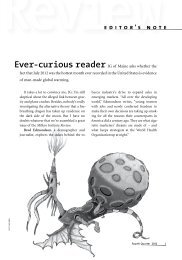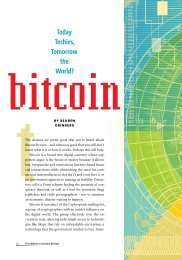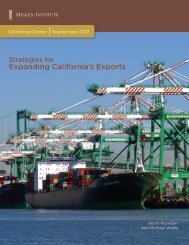The Rise and Fall of the U.S. Mortgage and Credit ... - Milken Institute
The Rise and Fall of the U.S. Mortgage and Credit ... - Milken Institute
The Rise and Fall of the U.S. Mortgage and Credit ... - Milken Institute
Create successful ePaper yourself
Turn your PDF publications into a flip-book with our unique Google optimized e-Paper software.
What can policymakers do to prevent financial<br />
institutions from becoming so big <strong>and</strong> so<br />
important that, regardless <strong>of</strong> any reckless<br />
behavior on <strong>the</strong>ir part, <strong>the</strong> government feels<br />
compelled to bail <strong>the</strong>m out?<br />
Consumers also need better <strong>and</strong> clearer information, as well as counseling, about complex products <strong>and</strong><br />
services. This includes <strong>the</strong> need to simplify <strong>and</strong> improve mortgage documentation <strong>and</strong> to focus on increasing<br />
financial literacy among <strong>the</strong> broader public.<br />
Market discipline is weakened to <strong>the</strong> extent <strong>the</strong>re is a widespread belief that <strong>the</strong> government will always come to<br />
<strong>the</strong> rescue. Such a belief promotes complacency <strong>and</strong>, worse yet, an increased culture <strong>of</strong> risk-taking by individuals<br />
<strong>and</strong> firms. Clearly, many are crying out for something to be done about <strong>the</strong> moral hazard issues that have already<br />
been raised by <strong>the</strong> government’s actions to date. What can policymakers do to prevent financial institutions from<br />
becoming so big <strong>and</strong> so important that, regardless <strong>of</strong> any reckless behavior on <strong>the</strong>ir part, <strong>the</strong> government feels<br />
compelled to bail <strong>the</strong>m out? Also, how can policymakers wind down <strong>the</strong> extensive intervention into <strong>the</strong> private<br />
marketplace that has already taken place <strong>and</strong> shift consequences back to financial firms in an orderly manner?<br />
As a start, regulatory authorities must be more careful about endorsing, or seeming to endorse, <strong>the</strong> ratings<br />
conferred on firms <strong>and</strong> products by <strong>the</strong> major rating agencies. More effort should be devoted to requiring that<br />
better <strong>and</strong> more comprehensive information be provided to market participants so <strong>the</strong>y can perform <strong>the</strong>ir own<br />
due diligence to a greater extent when making financial decisions.<br />
What can be done to more safely facilitate homeownership?<br />
At <strong>the</strong> outset, it is time to admit that <strong>the</strong>re is nothing wrong with being a renter. But if homeownership is to<br />
be promoted by <strong>the</strong> government, <strong>the</strong> process needs to be improved. It makes no sense to create institutions<br />
like Fannie Mae <strong>and</strong> Freddie Mac that have a dual m<strong>and</strong>ate: earning pr<strong>of</strong>its for <strong>the</strong>ir shareholders while<br />
simultaneously satisfying quotas on <strong>the</strong> amount <strong>of</strong> funding that must be provided to low-income families. It is<br />
clear by now that this is not a viable business model. It is <strong>the</strong>refore essential to make a clear decision about what<br />
to do with Fannie Mae <strong>and</strong> Freddie Mac, post-conservatorship.<br />
41















